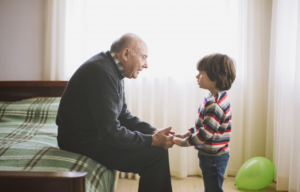Guilt, grief, and loss are common emotions that may plague relationships between a caregiver, his/her loved one with dementia, and friends and family. As the caregiver, you may resent other family members who are not helping. You may feel the loss of the relationship you used to have with your loved one, whose personality will change over time. If you are caring for your parent, your roles may be reversed so that you become the parent and they the child. And yet, it is important to continue to respect your loved one as what they were to you before dementia. Friends may not know how to deal with you and your loved one. They may feel awkward or embarrassed to stay in contact, not knowing what to expect.
However, it is important for your own peace of mind and that of your loved one that you maintain these important relationships with your friends and that your loved one’s friends stay informed and in touch. It will bring joy to your loved one to hear from family members who send regards, cards, even small gifts. If you are certain that it is safe for them to visit, your loved one will benefit from a visit—and if an in-person visit is not feasible, a familiar voice on the phone or a video on a tablet or computer will often bring a smile to his/her face.
Pets are often a comfort to people living with dementia.
Pets are family members, and they can be extremely comforting to a person living with dementia. In the early stages, your loved one will take the same comfort and pleasure as in the past from petting a dog or holding a beloved cat. In later stages of dementia, it can be a comfort to hold a furry substitute for a dog or cat—just to have something for your loved one to hug. Today there are many sources for pets for persons living with dementia—here are a couple we like:
Cuddle Clones is a one-of-a-kind company that creates custom stuffed animals using photos to replicate owners’ pets. Reminding those living with dementia them of their furry friends can be of great comfort.
Joy for All offers those living with dementia with robotic loving and furry companions that can respond like a real animal. Joy for All pets help people living with dementia deal with isolation and loneliness.





